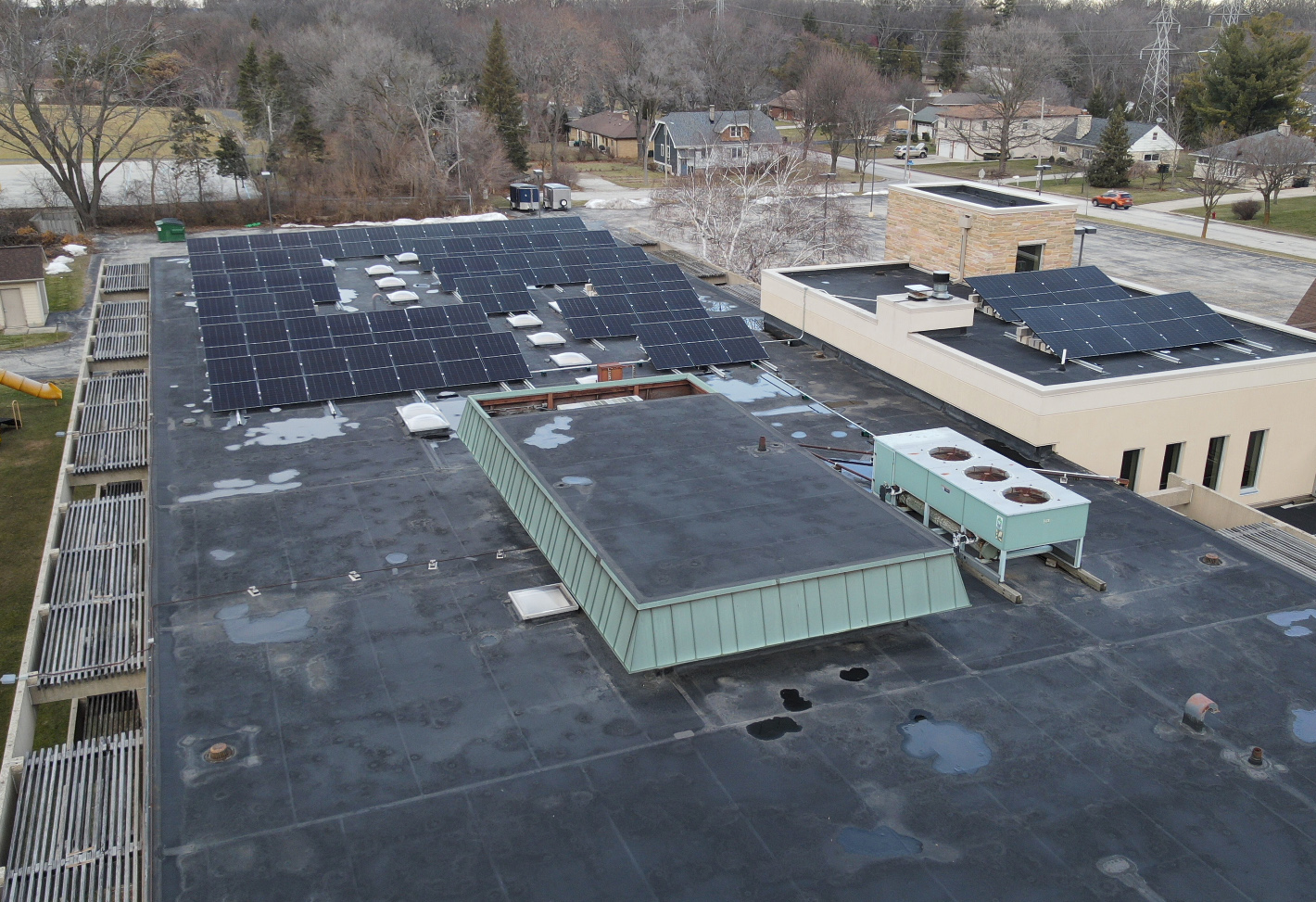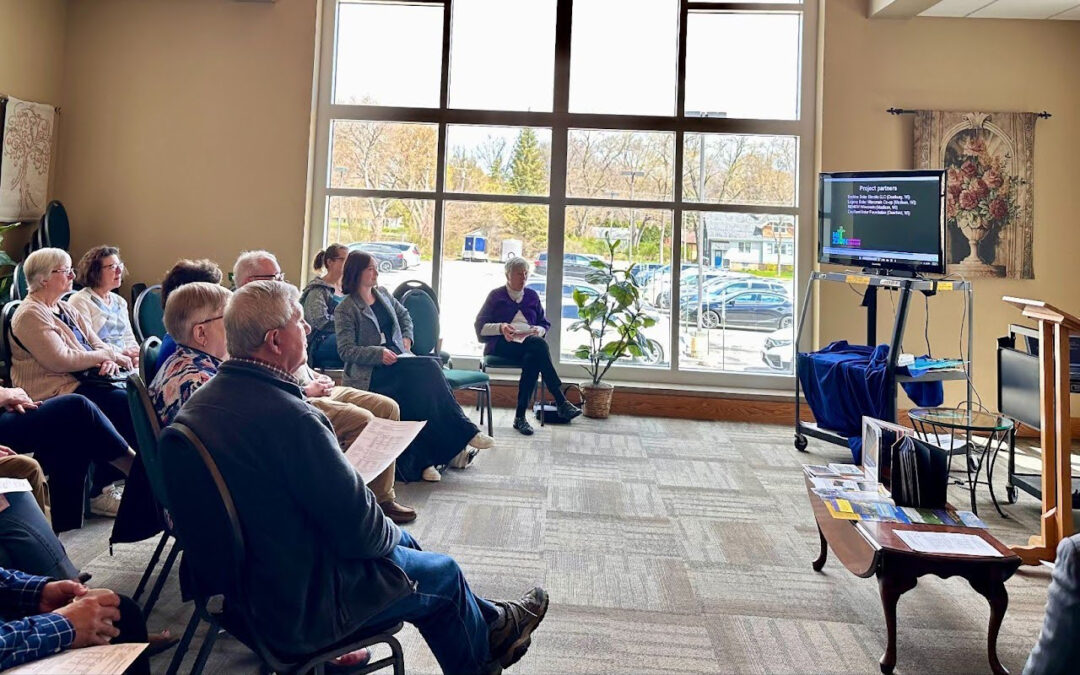On Sunday, April 27, 2025, Mt. Zion Lutheran Church in Wauwatosa, Wisconsin, hosted an educational session on the house of worship’s process behind the installation of a new 39.6-kilowatt solar array. The congregation welcomed key project partners, including Laurie Couillard from the Couillard Solar Foundation and representatives from RENEW Wisconsin, to join in celebration of this renewable energy achievement, and also to reflect on the church’s commitment to faith, community, and care for creation.
Mt. Zion’s congregation is deeply committed to the values of faith, community, hospitality, and justice, which are reflected in their work across worship, education, outreach, and social justice initiatives. The church has long upheld these values, exemplified through programs such as the Tosa Cares food pantry and its support for MICAH, a local organization dedicated to racial justice. For over 20 years, Mt. Zion has also been a devoted advocate for the inclusion of LGBTQ+ individuals and families. A core aspect of carrying out the church’s mission includes its dedication to environmental stewardship by honoring and protecting the earth. This commitment to sustainability is evident in ongoing efforts to reduce energy consumption and give back to the planet. In 2024, Mt. Zion was recognized with an Energy Star award for significant upgrades, including switching to LED lighting, installing programmable thermostats, and weatherizing windows and skylights.
The church has also integrated environmental sustainability into its ministry through projects like an active pollinator garden and plans for a stormwater bioretention basin to manage runoff. Education plays a central role in this green initiative, with church leaders planning forums on solar energy to encourage the community to embrace renewable solutions. The opportunity to transition to clean, renewable energy initiated a new chapter in its story of creation care, enabling Mt. Zion to further demonstrate its commitment to both environmental sustainability and social justice.
In January 2024, Mt. Zion took an additional significant step towards sustainability by beginning planning efforts to install a 39.96-kilowatt solar system on the education wing of the church’s facilities. The Inflation Reduction Act’s clean energy tax credits for nonprofit organizations accelerated this transition, making the incorporation of renewable energy more affordable. The project received an additional boost from Energy Community Tax Credit Bonuses. Energy Community credits provide financial incentives for clean energy upgrades, particularly in communities impacted by the decommissioning of coal plants, supporting both a green economy and energy equity.
Douglas Johnson, a longtime member and passionate advocate for renewable energy, spearheaded the planning and implementation of the house of worship’s solar project. Johnson, who had installed a 3.72 kW solar array at his own home in 2008, has been an educator and advocate for solar energy. His leadership ensured the successful implementation of the project at Mt. Zion through his partnerships with nonprofit organizations and research into financing methods.
Funding for the solar system came through the generous support of the Solar for Good Program, which donated 37 solar panels, reducing the project’s costs by over $10,000. Additionally, Legacy Solar Co-Op provided financing for the installation through a 12-year loan at a competitive 6.75% interest rate, making the project both environmentally and financially viable. The church has already seen net savings of over $200, with a projected 135% return on investment over the life of the system.

With financial opportunities secured, installation of the system was able to begin in November of 2024. Endries Solar and Electric installed 74 high-efficiency bifacial panels with power optimizers, devices that maximize each panel’s energy production by adjusting performance based on conditions like shading or cloud cover, ensuring the system operates at optimal efficiency. By December of 2024, the church was able to begin harnessing the power of the sun through its new 39.96 kW solar system. By incorporating clean energy into its daily operations, Mt. Zion’s efforts epitomize how faith communities and other nonprofits can lead the way in a sustainable future for Wisconsinites. Mt. Zion’s careful monitoring of its solar system performance highlights the potential of clean energy. In April alone, the system offset 52% of the church’s energy usage, helping to support its core programs with greater financial stability.
This solar project showcases how faith communities can lead the way in Wisconsin’s clean energy transition. By integrating sustainability into its operations, Mt. Zion has not only reduced energy costs but also showcased that faith and environmental responsibility can go hand in hand. The solar array is just one part of the church’s broader commitment to caring for God’s creation and supporting its community. The celebration of the Gift of Light is not just about the energy generated by the solar panels; it is a reflection of hope, faith, and a commitment to building a sustainable future for all. As other churches and organizations look to Mt. Zion as a model, this project demonstrates how renewable energy investments can align with core values of stewardship, justice, and care for creation.

